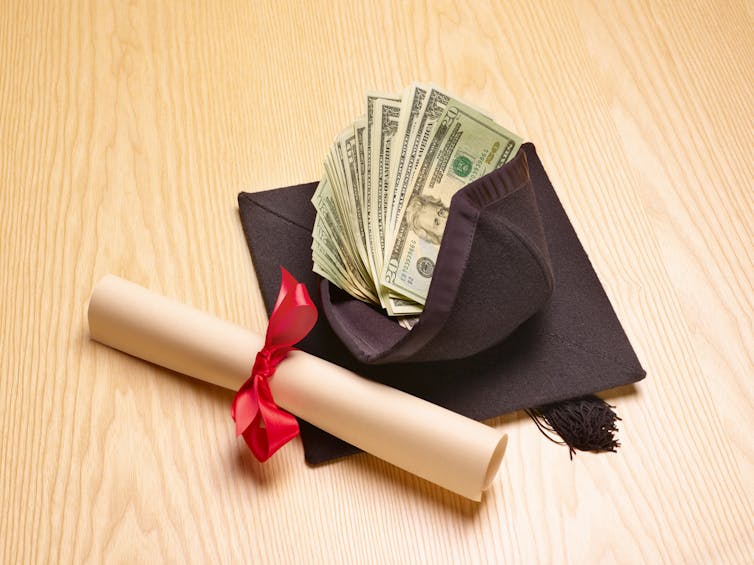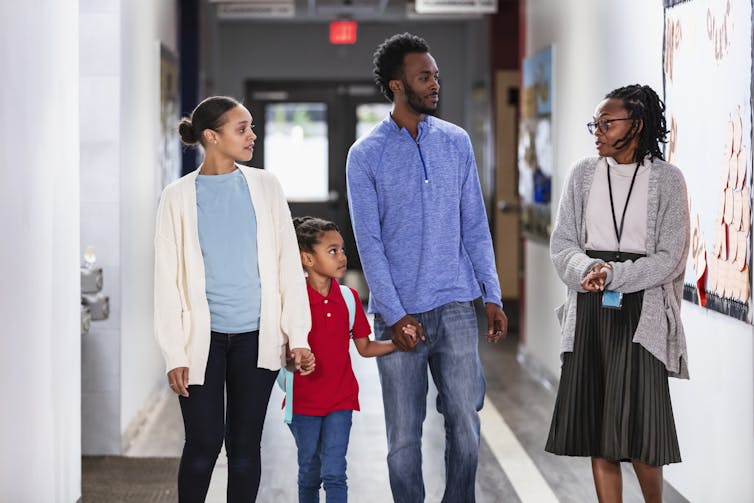
By Kendall Deas
School voucher programs that allow families to use public funds to pay tuition to attend private schools have become increasingly popular.
Thirteen states and the District of Columbia currently operate voucher programs.
In addition, 15 states have universal private school choice programs that offer vouchers, education savings accounts and tax credit scholarships.
More states are considering school choice and voucher programs as the Trump administration advocates for widespread adoption.
School vouchers have a long history in the U.S.
The first vouchers were offered in the 1800s to help children in sparsely populated towns in rural Vermont and Maine attend classes in public and private schools in nearby districts.
After the U.S. Supreme Court’s 1954 Brown v. Board of Education decision, in which justices ruled that separating children in public schools on the basis of race was unconstitutional, segregationists used vouchers to avoid school integration.
More recently, school voucher programs have been pitched as a tool to provide children from low-income families with quality education options.
As a scholar who specializes in education policy, law and politics, I can share how current policies have strayed from efforts to support low-income Black children.
History of school voucher programs

Peter Dazeley/Getty Images
Research from education history scholars shows that more recent support for school choice was not anchored in an agenda to privatize public schools but rooted in a mission to support Black students.
Over time, as school voucher policies grew in popularity, they evolved into subsidies for middle-class families to send their children to private and parochial schools.
School choice policies have also expanded to include education savings account programs and vouchers funded by tax credit donations.
Vouchers can redirect money from public schools, many of which are serving Black students.
Impact on public schools

Connect Images via Getty Images
States looking to add or expand school choice and voucher programs have adopted language from civil rights activists pushing for equal access to quality education for all children. For example, they contend that school choice is a civil right all families and students should have as U.S. citizens. But school voucher programs can exclude Black students and harm public schools serving Black students in a host of ways, research shows.
This impact of voucher programs disproportionately affects schools in predominantly Black communities with lower tax bases to fund public schools.
Since the Brown v. Board ruling, school voucher programs have been linked to racial segregation. These programs were at times used to circumvent integration efforts: They allowed white families to transfer their children out of diverse public schools into private schools.
In fact, school voucher programs tend to exacerbate both racial and economic segregation, a trend that continues today.
For example, private schools that receive voucher funding are not always required to adopt the same antidiscrimination policies as public schools.
School voucher programs can also negatively impact the quality of public schools serving Black students.
As some of the best and brightest students leave to attend private or parochial ones, public schools in communities serving Black students often face declining enrollments and reduced resources.
In cities such as Macon, Georgia, families say that majority Black schools lack resources because so many families use the state’s voucher-style program to attend mostly white private schools.
Moreover, the cost of attending a private or parochial school can be so expensive that even with a school voucher, Black families still struggle to afford the cost of sending children to these schools.
Vouchers can siphon school funding

kali9/Getty Images
Research from the Economic Policy Institute, a nonpartisan, nonprofit think tank based in Washington, D.C., shows that voucher programs in Ohio result in majority Black school systems such as the Cleveland Metropolitan School District losing millions in education funding.
This impact of voucher programs disproportionately affects schools in predominantly Black communities across the U.S. with lower tax bases to fund public schools.
Another example is the Marion County School District, a South Carolina system where about 77% of students are Black.
Marion County is in the heart of the region of the state known as the “Corridor of Shame,” known for its inadequate funding and its levels of poor student achievement. The 17 counties along the corridor are predominantly minority communities, with high poverty rates and poor public school funding because of the area’s low tax base due to a lack of industry.
On average, South Carolina school districts spent an estimated US$18,842 per student during the 2024-25 school year.
In Marion County, per-student funding was $16,463 during the 2024-2025 school year.
By comparison, in Charleston County, the most affluent in the state, per-student funding was more than $26,000.
Returning voucher policy to its roots
Rather than focus on school choice and voucher programs that take money away from public schools serving Black students, I argue that policymakers should address systemic inequities in education to ensure that all students have access to a quality education.
Establishing restrictions on the use of funds and requiring preferences for low-income Black students could help direct school voucher policies back toward their intent.
It would also be beneficial to expand and enforce civil rights laws to prevent discrimination against Black students.
These measures would help ensure all students, regardless of background, have access to quality education.
![]()
Kendall Deas is Assistant Professor of Education Policy, Law, and Politics at the University of South Carolina.





























Bill Mayne says
The state legislature considers the school funding as miserly school funding as a waste of Florida’s tax money. They would much prefer their voting base to receive the monies. they fail to realize the future of Floida is at stake.
Their primary task ought to be proving Florida students with the best education possible. They follow Republican ethos where students are provided with the minimum funding that the Legislature can allocate.
Teachers are under paid. Florida ranks in the near to bottom in teacher pay.
The Legislature must do better if students can successfully enter the marketplace. The students are at a huge disadvantage in employment choices in perceived Republican future.
The Legislature already chose the winners and losers of the future and it is not the Florida students.
Al says
Washington DC where black students are going to private schools seems awfully racist. Why would you even consider that black families in DC could be middle class?
This is another biased article using racism as a cover for the authors hatred of the system. In the cases that were discussed there appears to be black students and families wanting out of the failing schools. According to the author only white people are middle class and all minorities are poor , this is not the case. When will this paper start putting honest discussions instead of race baiting.
don miller says
majority students need better schools also. time for the public schools to step up and produce a quality product if they want to have students and parents trust them..
Marvin Clegg says
Here, unfortunately, appears to be another self-proclaimed “education expert” like those who have presided over the steady decline of the US public education system for decades. Their tired “solutions” of throwing money at problems, busing innocent kids far from home, and blaming racism to attempt a guilt trip silencing of concerned parents are finally being questioned in significant ways. Busing may temporarily raise test scores, but it isn’t because of anything these experts did to improve the education there.
It’s funny though, that as parents who have tried the public school system at two different age periods over the last decade, we now get voucher assistance equaling less than HALF of what the writer says poor, underprivileged area schools are
getting to operate their failing systems in some areas. Half! So, maybe these experts can explain how many schools that parents migrate towards can achieve better results with LESS money than the taxpayers are paying into bloated bureaucratic failures. That would involve real, time-consuming research and they would find no simple answers.
I know quite a few public school teachers who have fled the red tape public school world, full of students whose parents have not backed teachers by doing the ‘heavy lifting’ of enforcing discipline, homework completion, reasonable manners at home, and dumped problem kids into a public system that has been forced to accept behavior problems, respond to ideological court orders, participate in social experiments from all quarters, teach to the test, and play computer technician all in one class period.
I substitute taught in one public school during our last attempt to attend school nearer home, only to be told at the end of the first day that my job was really to babysit, and not try to teach. I learned that in this school, heavily populated by non-white students whose parents may not have known what to demand in the way of a good education, the cellphone was the “go-to” solution to help keep unmotivated middle and high school students calm and “occupied.” The officials couldn’t really take the cellphones away, one teacher explained, because they were needed in some instances to replace non-functioning school laptops which replaced the “old-fashioned” textbooks. Very sad.
So, let’s see these education experts turn their attention to REAL solutions of a more complicated nature rather than continue the failed “mo money” litany. It’s going to involve looking at parents who don’t seem motivated to parent their children, much less improve their local schools, which is not a simple fix. It’s probably going to face the reality that there will always be some people who prioritize larger sports programs with higher school populations or newer buildings over a basic, solid education. And clearly our culture supports extravagant sports and entertainment salaries over rewarding scientists, educators, first responders and other high risk heroes like astronauts and soldiers.
Let’s be honest and quit going for the low-hanging fruit in our research. More money clearly hasn’t solved every problem in the public sector, and “voucher parents” trying to get the best education they can for their children, usually spending less money overall than what taxpayers spend on a public school student, are not the problem in a failing public education system.
Bo Peep says
The intent is to allow parents to pick another school when they are unhappy with what is being taught at a particular school or schools. Then when the schools that are teaching the unpopular topics for other people’s children run out of operating funds they will stop teaching the unpopulated topics.
Deborah Coffey says
Under President Obama,, the right wing rejected using Common Core (critical thinking) style of education that the top scoring OECD countries employ. Maybe that’s why the United States consistently remains near the bottom of those countries. We’re too arrogant to use proven techniques and policies from others we believe are beneath us…like single payer healthcare and taxing the wealthy. So much for American exceptionalism and America First. The Republican Party has failed us in every way since Ronald Reagan became the POTUS.
JohnB says
Why shouldn’t the middle class enjoy the same benefits as the poor, they are the ones who are paying for it real estate and sales taxes.